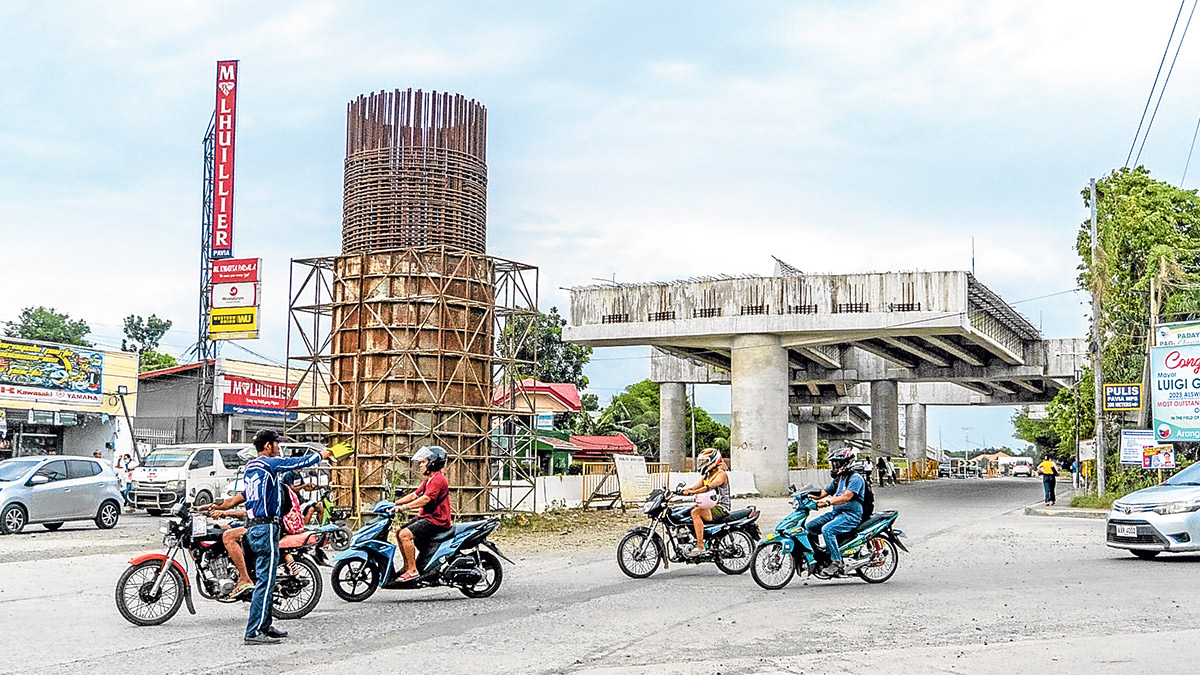
TOO SHALLOW The P802-million Aganan flyover in Pavia, Iloilo, whose construction was halted in 2022, remains unfinished as of this April 21 photo. Its 22-meter deep foundations are driven at barely half of the 54-m depth needed to stabilize the structure, said the Department of Public Works and Highways. IAN PAUL CORDERO
ILOILO CITY, Philippines — Soil testing on the area where another multimillion-peso controversial flyover in Pavia town in Iloilo province was constructed has shown measurement discrepancies that put into question its stability.
The confirmatory and seismic testing conducted by the Department of Public Works and Highways in Western Visayas (DPWH) revealed that the Aganan flyover’s foundations needed a depth of 54 meters to reach stable soil, as against the current depth of 22 meters was determined by the United Technologies Consolidated Partnership (UTCP), the firm that provided the structural design for the flyover.
Sanny Boy Oropel, DPWH regional director, said they reached out to UTCP to discuss the matter but they had yet to receive a response.
READ: Iloilo execs slam DPWH6’s ‘unresponsiveness’ over flyover
READ: DPWH halts another Iloilo flyover project
“We are very worried about Aganan [flyover]. As of now, we haven’t seen any problems, but it is on the same alignment as the Ungka [flyover]. UTCP is claiming that their design was correct,” he said in an interview on Monday.
The 453.7-meter Ungka flyover, a P680-million separate project in Pavia town found to be “sinking” just months after it was opened in June 2022, was closed in September of the same year after public complaints over the “wavy feel” while driving over it, as well as reports and images of flooding at the top of the flyover during rainy days.
On the other hand, the construction of the 436.90-meter P802-million Aganan flyover, which is just a kilometer from the Ungka span, was about 70 percent complete when it was stopped in 2022 by Oropel’s predecessor, now DPWH Assistant Secretary Nerie Bueno, citing similarities in soil conditions with the nearby Ungka flyover.
While the Ungka flyover has been partially opened since late 2023, the Aganan flyover has yet to be finished. DPWH-6 is still awaiting the approval of a P15-million allocation from its central office to engage a third-party consultant to further investigate Aganan’s structural integrity.
READ: DPWH partially reopens Iloilo ‘sinking’ flyover
“I cannot provide a timetable for the Aganan flyover, considering that the budget being requested for the consultant is still to be released,” Oropel said.
Ungka’s rectification
As for the Ungka flyover, an investigation by a Pasig-based engineering consultancy firm showed defects in three piers that needed rectification.
Structural engineer Adam Abinales, head of the third-party consultant hired by the DPWH, earlier said the flyover needed engineering interventions.
Abinales said piers 4, 5 and 6 of the flyover’s 16 piers sank by more than a foot between May 2022 and April 14, 2023. Pier 5 sank by 22.9 inches, Pier 6 by 19.21 inches and Pier 4 by 16 inches. The other piers also plunged by 0.66 inches to 5.94 inches.
As of last Monday, they have accomplished around 28 percent of the rectification work, said Oropel.
The corrective works, which started last January, are set to proceed into phase two in May, which consists of the deconstructing and application of bored piles on the piers. A pier is a type of structure that extends to the ground below or into the water. It is used to support the flyover and transfer the loads to the foundation.
Oropel said the implementation of the second phase would depend on the results of their current jet grouting, a ground reinforcement technique. The target to finish all works on the Ungka flyover is on Aug. 31 of this year.
The Ungka flyover was funded through the efforts of former Sen. Franklin Drilon to cut travel time from Iloilo City to the Iloilo International Airport in Cabatuan town.

